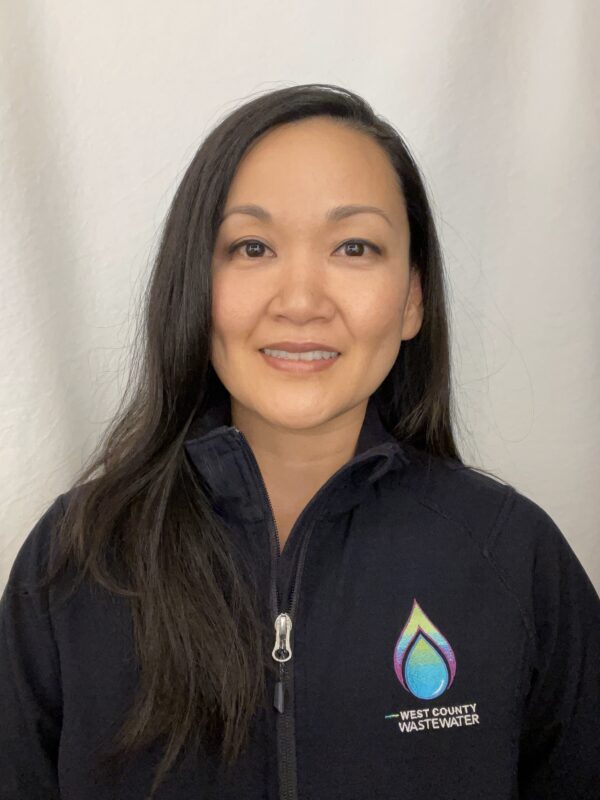
West County Wastewater’s (WCW) Plant Operator, Valerie Sakata
West County Wastewater’s (WCW) Plant Operator, Valerie Sakata, started out as a student at the City College of San Francisco, where she studied biotech. As she immersed herself in science, particularly genetics, and pharmaceuticals, she noticed how many one-time-use lab items were regularly thrown away to end up in a landfill. This steered her thoughts toward the environment.
As she continued to think about the relationship between science and the environment, a shift began in Valerie’s path. She became more interested in environmental science and began studying environmental monitoring, which is how we assess environmental conditions and trends and develop information for reporting.
While continuing her education in San Francisco, Valerie attended a California Water Environment Association (CWEA) student mixer, where she met a wastewater operator and a lab analyst and was introduced to the wastewater industry. The more she learned, the more she felt this might be the fit she was looking for, blending science, monitoring, and the environment into what she felt was her true calling.
The more she learned about the wastewater industry, the more connected she felt, and she wondered if she had finally found her passion.
“I felt like I found my path.”
Valerie transferred to Solano Community College, which has a robust water and wastewater technology curriculum, and began making meaningful connections with her classmates and teachers. At a career fair held at Contra Costa College, Valerie met WCW’s Environmental Programs Manager, Joe Neugebauer, and he encouraged her to join an upcoming student tour at WCW’s Water Quality and Resource Recovery plant in Richmond. Here, she went on to meet WCW’s Lab Manager, Geraldine Gonzales, and later Shift Supervisor and Plant Operator, Roy Castillo.
These connections were her introduction to WCW, and she began learning about the goals, projects, and environmental work being done.
Valerie grew up in West County, living in Pinole and Hercules, earning her associate degree from Solano Community College in 2020. Her degree is in Water and Wastewater Technology, and as of April 2023, Valerie holds a State Water Resources Control Board (SWRCB) Grade III certificate.
Veolia Water Technologies & Solutions operates and maintains much of the City of Richmond’s wastewater treatment. Here, Valerie worked as a Lab Analyst. Once she completed her Operator in Training hours, she was promoted to an Operator position.
On March 15, 2021, Valerie was hired as a Plant Operator at WCW, where she began a new career chapter. Valerie embraced the opportunity to work for a public agency. She was drawn to the culture and diversity, and she could now serve the community she was raised in and have a chance to be part of WCW’s Women in Wastewater.
“Within the short 2-year period Valerie Sakata has been with the district, she has become an integral part of the WCW operations group.” -Andre Welles, WCW’s Operations Field Supervisor.
Valerie doesn’t find it challenging to work in a primarily male-dominated field. She’s worked hard for her degree and certifications and has gained valuable experiences during her career. She’s done her homework, learned about the industry, and got to know WCW before being hired- she knew the job. Her advice to young women who may be considering a career in the wastewater field is to apply themselves, ask questions, and don’t be afraid to ask for help.
Valerie’s family has helped her get to where she is today. Her family still lives in West County, and Valerie’s younger sister is also in the wastewater field.
“My mom is definitely a positive influence. She never pressured me and always wanted my sister and I to be happy.”
What advice would Valerie give about continuing to learn and grow in a career? Valerie suggests surrounding yourself with positive people and attending work events and facility tours. She also suggests finding a mentor and having good support at home. Also, continue learning! She feels it’s important to keep studying and striving for the next level of learning.
We asked Valerie what she would say to someone who may have told her she couldn’t do something because of some diverse quality about herself. She answered that she would acknowledge that person’s comment and then go on to prove that she could do anything she put her mind to.
“Work hard and be nice to people.”
Valerie is the perfect example of how we should be persistent in our career- even if we’re unsure where it will take us. Stay curious, keep learning, and you’ll find your path.